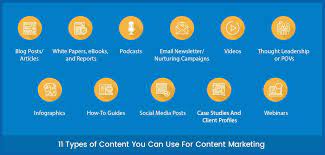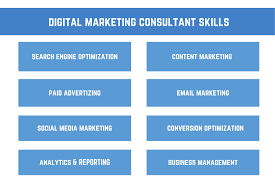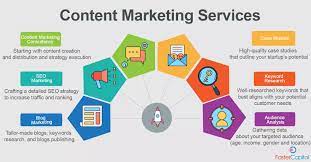Exploring the Diverse Types of Content Marketing: A Comprehensive Guide
Types of Content Marketing
Content marketing has become an essential strategy for businesses to engage with their target audience, build brand awareness, and drive conversions. With the rise of digital platforms and the increasing demand for valuable and relevant content, businesses are exploring various types of content marketing to connect with their customers. In this article, we will explore some popular types of content marketing that can help businesses achieve their goals.
- Blog Posts: Blogging is one of the most common and effective forms of content marketing. By creating informative and engaging blog posts, businesses can establish themselves as thought leaders in their industry and provide valuable insights to their audience. Blog posts can cover a wide range of topics, from educational articles to industry trends and product updates.
- Social Media Content: Social media platforms have become powerful tools for content marketing. Businesses can share a variety of content on social media, including images, videos, infographics, and short-form text posts. Social media enables businesses to connect directly with their audience, spark conversations, and drive engagement.
- Videos: Video content has gained tremendous popularity in recent years due to its ability to capture attention quickly and convey information effectively. Businesses can create videos in various formats such as tutorials, product demonstrations, customer testimonials, or even behind-the-scenes glimpses into their operations.
- Infographics: Infographics are visually appealing representations of information or data that make complex concepts easier to understand. They combine images, charts, graphs, and concise text to communicate key messages quickly. Infographics are highly shareable and can be used across multiple channels.
- Ebooks/Guides: Creating in-depth ebooks or guides allows businesses to showcase their expertise on specific topics while providing valuable resources for their audience. Ebooks can be used as lead magnets by offering them as downloadable assets in exchange for contact information.
- Podcasts: Podcasts have gained significant popularity in recent years as a convenient form of content consumption. Businesses can create podcasts to share industry insights, interview experts, or discuss relevant topics. Podcasts allow for a more intimate and personal connection with the audience.
- Case Studies: Case studies are powerful tools for showcasing how businesses have helped their clients solve specific problems or achieve desired outcomes. They provide real-life examples of success and build credibility for the business.
- Webinars: Webinars offer businesses the opportunity to engage with their audience in a live and interactive format. They can be used to educate, demonstrate products/services, host Q&A sessions, or provide training.
These are just a few examples of the many types of content marketing available to businesses today. The key is to understand your target audience, their preferences, and the platforms they frequent. By creating diverse and valuable content across multiple channels, businesses can effectively reach and engage with their audience, ultimately driving brand awareness, customer loyalty, and business growth.
Remember, consistency is key in content marketing. Regularly publishing high-quality content that resonates with your audience will help establish your brand as a trusted source of information and keep your customers engaged over time.
Commonly Asked Questions about Types of Content Marketing
- What are the 3 types of content?
- What are the 4 main categories of content marketing?
- What are different types of marketing content?
- What are the 7 steps of content marketing?
- What are the 5 types of content?
What are the 3 types of content?
The three types of content are:
- Educational Content: This type of content aims to provide valuable information and knowledge to the audience. It focuses on educating and enlightening readers or viewers about a specific topic, industry, or subject matter. Educational content can take the form of blog posts, articles, tutorials, how-to guides, whitepapers, and informative videos.
- Entertaining Content: Entertaining content is designed to captivate and engage the audience by offering enjoyment or amusement. It focuses on providing entertainment value through storytelling, humor, emotional appeal, or creative elements. Examples of entertaining content include funny videos, engaging social media posts, quizzes, memes, and interactive games.
- Inspirational/Motivational Content: This type of content aims to inspire and motivate the audience by sharing stories of success, personal growth journeys, or uplifting messages. Inspirational content often includes personal anecdotes, motivational quotes, success stories from industry leaders or influencers, and uplifting videos that encourage viewers to pursue their goals and dreams.
By incorporating a mix of educational, entertaining, and inspirational content into their marketing strategies, businesses can effectively engage with their audience and build strong connections while delivering value in different ways.
What are the 4 main categories of content marketing?
The four main categories of content marketing are:
- Educational Content: This category focuses on providing valuable information and knowledge to the audience. It includes blog posts, articles, guides, tutorials, and how-to videos. The aim is to educate the audience about specific topics related to the business’s industry or niche.
- Entertaining Content: This category aims to captivate and engage the audience through entertaining content. It includes humorous videos, memes, quizzes, interactive games, and storytelling. The goal is to create enjoyable content that keeps the audience entertained while still aligning with the brand’s values and objectives.
- Inspirational Content: This category aims to inspire and motivate the audience. It includes success stories, case studies, personal anecdotes, and uplifting messages. Inspirational content helps build an emotional connection with the audience by sharing stories of achievement or overcoming challenges.
- Promotional Content: This category focuses on promoting products or services directly. It includes product demonstrations, customer testimonials, sales promotions, discounts, and special offers. Promotional content should be used strategically within a broader content marketing strategy to avoid overwhelming the audience with constant sales messages.
By utilizing a combination of these four categories in their content marketing efforts, businesses can effectively engage their target audience and achieve their marketing goals. It’s important to strike a balance between educational, entertaining, inspirational, and promotional content to provide a well-rounded experience for the audience while achieving desired outcomes for the business.
What are different types of marketing content?
There are various types of marketing content that businesses can utilize to engage with their target audience and promote their products or services. Here are some common types:
- Blog Posts: Written articles published on a blog, providing valuable information, insights, and updates related to the industry or niche.
- Social Media Content: Content specifically created for social media platforms, including text posts, images, videos, infographics, and polls.
- Videos: Visual content that can be shared on platforms like YouTube or social media. Videos can include product demonstrations, tutorials, testimonials, or brand storytelling.
- Infographics: Visual representations of data or information using charts, graphs, and concise text to make complex concepts easier to understand.
- Ebooks/Guides: In-depth resources that provide comprehensive information on a specific topic or offer step-by-step guidance for solving a problem.
- Case Studies: Detailed analyses of how a business solved a particular problem for a client or achieved successful outcomes in a specific project.
- Whitepapers/Research Reports: Comprehensive documents presenting research findings, industry insights, or expert analysis on specific topics.
- Podcasts/Audio Content: Audio recordings that cover various topics and can be listened to on podcast platforms or websites. Podcasts often involve interviews, discussions, or educational content.
- Webinars/Live Streams: Live online events where businesses can present educational sessions, host Q&A sessions with experts, or launch new products/services.
- Email Newsletters: Regularly sent emails containing updates about the business’s latest offerings, news in the industry, exclusive promotions, and valuable content for subscribers.
- User-Generated Content (UGC): Content created by customers or users of a product/service that showcases their experiences and opinions through reviews, testimonials, social media posts etc.
- Interactive Content: Engaging content that allows users to actively participate and interact with it such as quizzes, polls, surveys, calculators, or interactive infographics.
- Visual Content: Eye-catching images, graphics, illustrations, or memes used to convey messages or evoke emotions. Visual content can be shared on social media, websites, or in digital advertising.
- Product Descriptions: Detailed and persuasive descriptions of products or services that highlight their features, benefits, and unique selling points.
- Advertisements: Paid promotional content that can take various forms such as display ads, search engine ads (PPC), sponsored social media posts, or video ads.
These are just a few examples of the many types of marketing content available. The choice of content will depend on the business’s goals, target audience preferences, and the platforms they use to engage with their customers. A well-rounded content marketing strategy often involves utilizing a mix of these types to effectively reach and engage with the intended audience.
What are the 7 steps of content marketing?
Content marketing is a strategic approach that involves creating and distributing valuable, relevant, and consistent content to attract and retain a clearly defined audience. To effectively execute a content marketing strategy, businesses can follow these seven essential steps:
- Define Your Goals: Start by clearly defining your content marketing goals. What do you want to achieve? Whether it’s increasing brand awareness, driving website traffic, generating leads, or boosting customer engagement, having well-defined goals will guide your content creation process.
- Understand Your Audience: To create content that resonates with your target audience, you need to understand their needs, preferences, and pain points. Conduct thorough research to identify your audience’s demographics, interests, and online behaviors. This information will help you tailor your content to meet their specific needs.
- Develop a Content Strategy: A solid content strategy outlines the types of content you will create, the platforms you will use to distribute it, and the frequency of publication. It also includes an editorial calendar that ensures consistency in delivering valuable content to your audience.
- Create Compelling Content: This step involves brainstorming ideas and creating high-quality content that aligns with your strategy. Whether it’s blog posts, videos, infographics, or social media posts—focus on providing value to your audience by addressing their pain points or answering their questions.
- Optimize for SEO: Search engine optimization (SEO) plays a crucial role in making sure your content is discoverable by search engines and reaches a wider audience. Use relevant keywords strategically throughout your content and optimize meta tags, headings, URLs, and image alt tags.
- Distribute Across Channels: Once you have created valuable content, it’s time to distribute it across various channels—such as your website/blog, social media platforms (Facebook, Twitter), email newsletters—where your target audience is most active. Tailor the format of the content to suit each platform and engage with your audience through comments and shares.
- Analyze and Refine: Regularly monitor the performance of your content using analytics tools. Track metrics such as website traffic, engagement levels, conversion rates, and social media reach. Analyzing these metrics will help you identify what’s working well and what needs improvement. Adjust your content strategy accordingly to optimize results.
By following these seven steps, businesses can build a strong foundation for their content marketing efforts. Remember, consistency, quality, and relevance are key to attracting and retaining your target audience. Continuously analyze and refine your strategy based on audience feedback and changing market trends to achieve long-term success with content marketing.
What are the 5 types of content?
There are numerous types of content that businesses can create to engage their audience. While it’s challenging to narrow it down to just five, here are five common types of content that are widely used:
- Blog Posts: Blogging is a popular form of content marketing where businesses create written articles to share valuable information, insights, and stories with their audience. Blog posts can cover a wide range of topics and help establish the business as a thought leader in their industry.
- Videos: Video content has become increasingly popular due to its engaging nature. From explainer videos and product demonstrations to vlogs and behind-the-scenes footage, businesses can leverage videos to convey messages effectively and capture the attention of their audience.
- Infographics: Infographics combine visual elements like charts, graphs, and images with concise text to present complex information in an easily digestible format. They are highly shareable and can be used across various platforms to convey data-driven insights or explain concepts visually.
- Social Media Posts: Social media platforms provide an opportunity for businesses to connect directly with their audience through short-form content such as status updates, images, videos, polls, or even live streams. Social media posts help build brand awareness, foster engagement, and drive traffic to other content assets.
- Ebooks/Guides: Ebooks or guides offer in-depth information on specific topics relevant to the business’s target audience. They provide comprehensive resources that educate and solve problems for readers. Ebooks are often used as lead magnets by offering them as downloadable assets in exchange for contact information.
These five types of content represent just a fraction of what is possible in content marketing. It’s crucial for businesses to consider their target audience’s preferences and choose the types of content that align with their goals and resonate most effectively with their customers.






